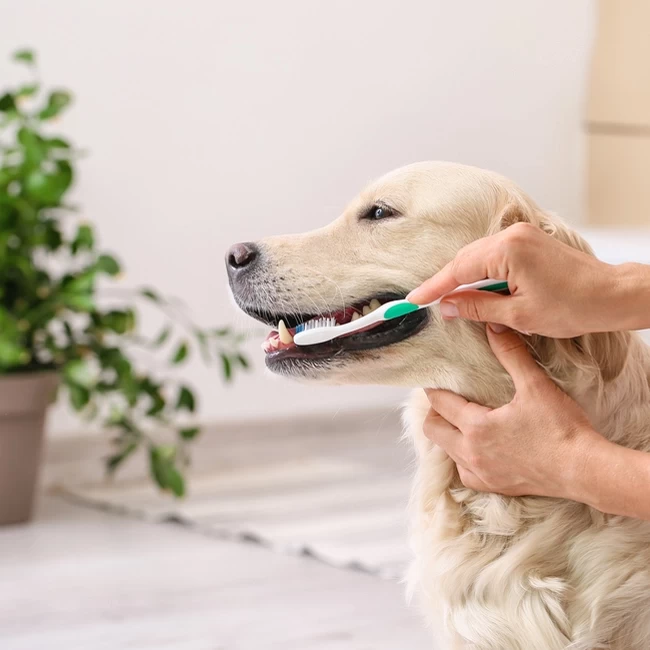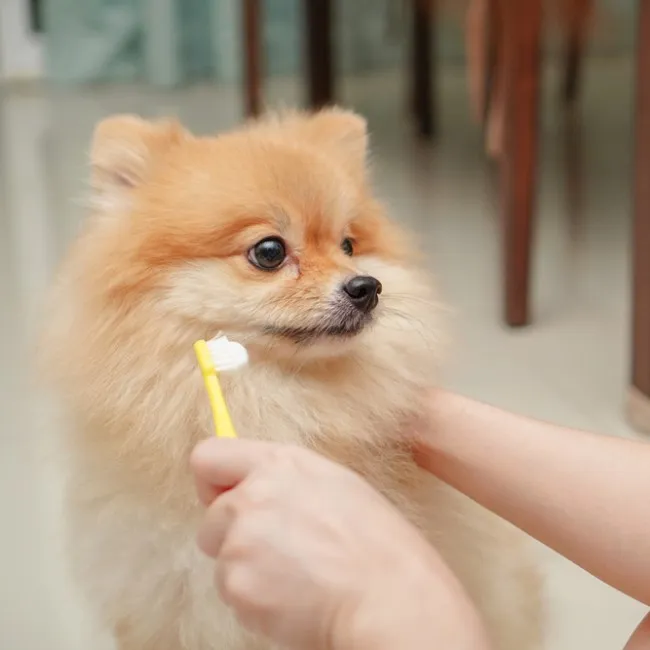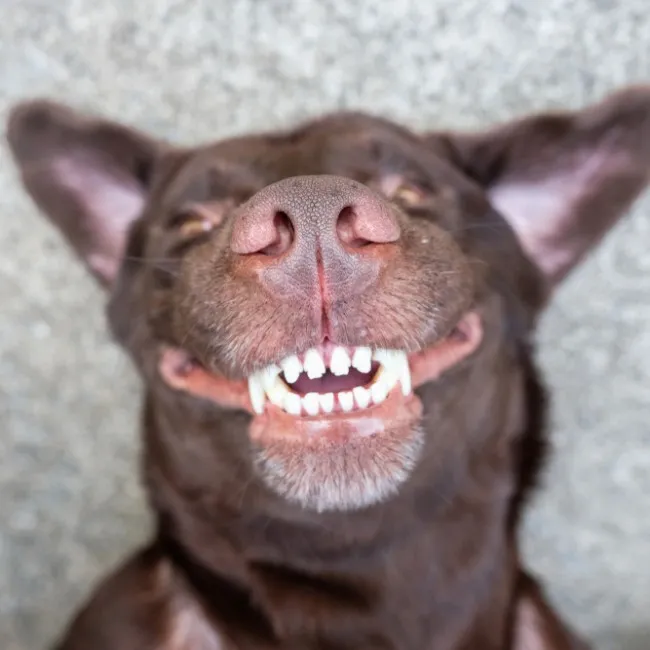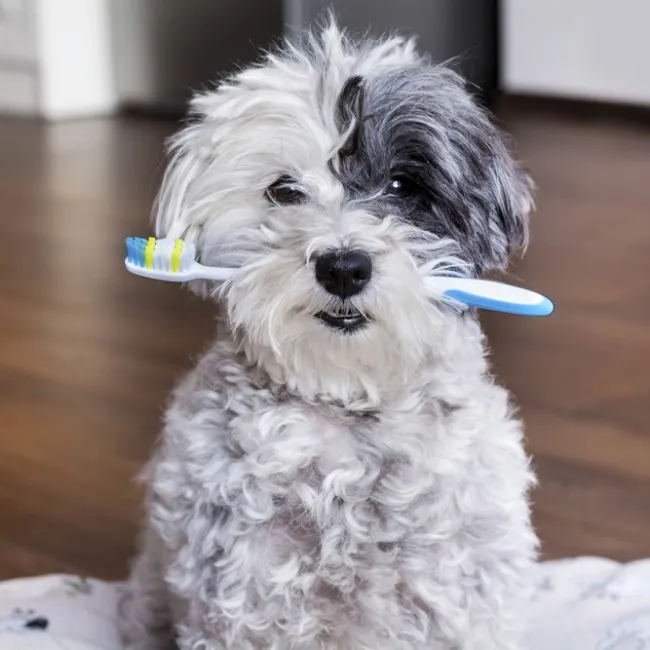How To Clean Your Dog's Teeth?

As a caring dog owner, looking after your dog’s wellbeing is close to your heart, and wanting them to be in tip-top shape is all part of caring for them on a daily basis. There are multiple factors to ensuring that your dog leads a healthy and happy life, and one that is often overlooked is dog dental health. Dog teeth cleaning is essential for helping your pooch on the way to a clean and clear set of teeth and gums. Failure to carry out dog dental cleaning can lead to a plaque build-up which can, in turn, lead to other oral complications for your dog. However, a big problem with dog teeth cleaning is carrying it out in the first place. Dogs can be very stubborn animals and a reluctance to dog teeth cleaning on their part can make it incredibly difficult to attain dog dental care for your pooch. So what is the best way to clean dogs teeth?
The Risk Of Dog Dental Problems
If you completely ignore dog dental care and just leave your dog’s teeth to their own devices, you could be risking more than just a sparkling set pearly whites. Your dog’s mouth is the primary tool that they use to explore the world around them, and neglecting it could have a profound effect on the rest of their body.
The problems that your dog's mouth can face are progressive in their nature. If your dog’s teeth are not cleaned, plaque will form on their teeth. Plaque is essentially a viscous liquid that is formed from saliva and food particles that have been left on the teeth following eating. Aside from the bad smell, plaque on dogs teeth actually isn't too much of a threat to your dog’s health. However, it is what the plaque then can become that provokes concern.
If plaque is allowed to build unchecked, it can harden and form tartar. Tartar is stuck fast to your dog’s teeth and is far harder to remove than the plaque. Aside from the bad smell and appearance, tartar can weaken the gums and teeth, and also damage and tear the gums. The torn gums can then provide an avenue through which dangerous bacteria can enter your dog’s blood and travel to the rest of their body. As we can begin to understand, dog dental problems get worse over time and dog dental cleaning is the best way to stop them ever happening in the first place! Here are some methods through which it can be carried out:
Traditional Dog Teeth Cleaning
If it isn’t broken why fix it right? The traditional method of dog teeth cleaning is carried out almost exactly how you would do it to yourself as a human, right down to the brush! But how would you even begin to brush your dog’s teeth in the same way you would brush yours?
Start Them Young
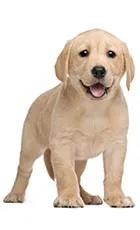
There is meaning in the saying ‘you can’t teach an old dog new tricks’, and this has pertinence when you consider dog teeth cleaning. The best way to clean dogs teeth is to get them started from a young age. The same goes for any routine that you wish your dog to adopt. If they are introduced to it as a puppy, they are more likely to be susceptible to it and then this will desensitise them too it as they grow older. Ultimately starting them from a young age will provide a significant difference in how they view dog teeth cleaning.
As a puppy, they will see it as a normal part of the day or week, but if you introduce them to it as an adult, they will see it as a probing hand invading their mouth and will treat the experience with hostile instinct. The best way to start is by simply putting some dog-friendly toothpaste on a cloth and then gently dabbing it on their teeth. As they grow older you can introduce the same toothpaste but on a dog toothbrush, where a similar routine as seen in humans can be enacted.
Get Behind Them
Although yes, it is important to pay your dog emotional support, in this case, we genuinely mean getting behind them! By approaching your dog for brushing from behind, it comes across as less imposing to them and they will be less agitated by you doing it. This also means you can gain better access to their mouth and makes for a scenario where it is easier to reassure them of your positive intentions.
Treat Them
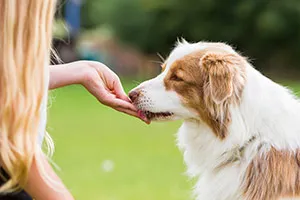
Behaviourally, dogs respond very much in the same way as us humans. Though there are dog dental chews out there, in this instance you can just rely on regular treats. This is because dogs are known to exhibit positive reinforcement. What that means is that rewarding a good behaviour with a treat can help ensure they repeat it. Starting young is the best thing to do, but if you are trying to wean an older dog onto brushing, a pat on the back, calling them a good dog, and giving them a treat immediately after dog teeth cleaning is done, is a great way to enforce positive reinforcement. This will then mean that they will establish a positive association with dog dental cleaning and be more obedient and receptive during future brushing.
Use The Right Products
It is also important to make sure you are looking at what you are putting in your dog’s mouth. Opt for a naturally sourced dog toothpaste supplement when engaging in dog teeth cleaning and also make sure you aren't using a brush that is so harsh that it cuts the gums. There are even plenty of dog toothpastes that come in specific meaty flavours. This can be great for forming that positive association.
Alternative Methods
That age-old saying, however, can ring true for some, and if trying to get your dog to willingly engage in dog teeth cleaning is too difficult, thankfully there are alternatives available that you can turn to. Namely, much like the dog toothpaste, there are a wealth of naturally sourced dog dental supplements and dog dental chews available to help deliver dog dental care. These, when taken alongside a sufficient diet, can help ensure healthy dog gums and teeth.
Preventative Dog Dental Care

Aside from dog teeth cleaning products and the best brushing techniques, there are also some preventative measures that you can take with your dog to ease the process of giving them ideal dog dental care. Firstly, plaque on dogs teeth is heavily influenced by the composition of your dog’s diet. The right diet can go a long way to helping alleviate the risk of dental problems. For example, a diet that is high in sugar can be damaging to your dog’s teeth, as can one that is high in processed foods. Always check the label for what is in the food you give your dog to ensure that it is suitable for keeping their teeth in and gums in check.
You should also take the effort to regulate not just what they eat, but what goes in their mouth in general! Often, dog dental problems can be caused by chipped and broken teeth as a result of chewing on hard objects, sticks or even hard surfaces. Make sure that your dog has plenty of toys that they can turn to chew on as these provide a safer option for their teeth. It is also important to look at ways to introduce dental supplements into your dog’s day to day life. The best kind are ones that have been naturally sourced as they are less likely to carry potentially harmful chemicals and additives.
